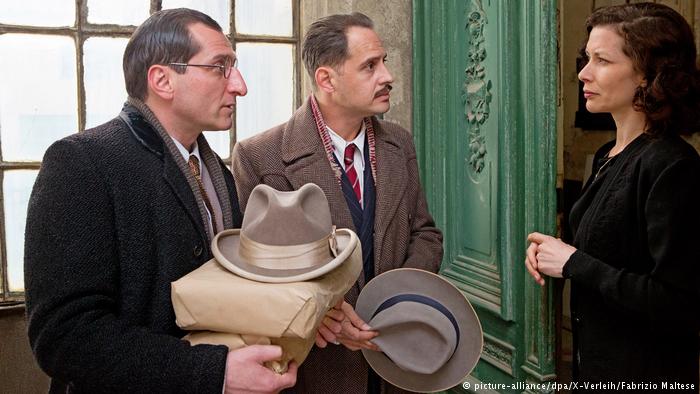BYE BYE GERMANY (Es war einmal in Deutschland)
Film Movement
Reviewed by: Harvey Karten
Director: Sam Garbarski
Screenwriter: Michel Bergmann, Sam Garbarski, based on Michel Bergmann’s “Die Teilacher” and “Machloikes
Cast: Moritz Bleibtreu, Antje Traue, Tim Seyfi, Mark Ivanir, Anatole Taubman, Hans Low, Pal Macsai, Vaclav Jakoubek
Screened at: Critics’ link, NYC, 4/7/18
Opens: April 27, 2018
Here are some of the words that turn up in Sam Garbarski’s “Bye Bye Germany.” Schlemiel, L’Chaim, Tsuris, Shiksa, Schmuck, Tuchis, Meshuga, Mazel. Do you know what these words mean? Each is the basis for a little gag in a movie that is loaded with jokes. If you are not familiar with any of these Yiddish and Hebrew terms, no matter. You will understand them in context. Jokey though the film may be, it has serious intentions. The humor is often dark and ironic, the greatest irony being that 4,000 Jews including the principal character in “Bye Bye Germany” remained in Germany after the war, while most, after a stay in a Displaced Persons camp, took off for America and Palestine (later Israel).
David Bermann (Moritz Bleibtreu), who holds his own throughout the movie as its anchor and hero, is one Jew camps survivor who in 1946 chooses to make a good living selling linens to Germans in Frankfurt. He is questioned by Special Agent Sara Simon (Antje Traue), who seems suspicious of any Jew who survived internment, and in this case she wants to find out whether Bermann should be punished as a collaborator with the Nazis. Remember that some Jews were able to live longer than expected in horrific concentration camps like Auschwitz by playing musical numbers to make the condemned think they are going to the shower room and not the gas chambers. Others, called kapos, were the Jewish police assigned by the Nazis to keep order, and some of them did so with the same brutality as the German officers on duty. They are considered the lowest form of humanity among the prisoners. Another way to survive was to entertain the SS, which is the way that Bermann, always ready with a quip to get the commandant (Christian Kmiotek) in stitches, is valued by the Obersturmbanführer, “even though a Jew.” This film is Bermann’s story to the special agent, who is skeptical of his claims. And we in the audience are treated to his backstory, some of which involve embellishments, and some punctuating the way that Bermann, who raises a group of fellow survivors, manages to con some of the non-Jews of Frankfurt into buying his linens.
The story is adapted from the first two books by the German-Swiss novelist Michel Bergmann’s Teilacher trilogy, about a group of Jewish traveling salesmen.
Like the three-legged dog that appears now and then, hobbling along as though scarcely knowing that he is handicapped, Bermann makes the best of his precarious situation together with his partner Holzmann (Mark Ivanir). In one scam David, who is the son of people who sold linens in a high-end store in Frankfurt until it was burned down, uses the old trick of pretending that a dead soldier had given an order and that his widow would naturally want to accept the linens and pay. This is not only a way of raising money but also getting revenge on the Germans. However the most significant vengeance is taken when one salesman, Krautberg (Vaclav Jakoubek), discovers that a man who sells newspapers is the very person who burned down a synagogue, killing Krautberg’s parents. Similarly special agent Sara gets her revenge by interrogating Nazis, a woman who had survived by escaping to American when escape was still a possibility.
Filmed in Luxembourg and Germany by cinematographer Virginia Saint-Martin, “Bye Bye Germany unfolds in a stunningrecreation of 1946 featuring cars with the split front windows that were the best that technology could offer at the same. Given Moritz Bleibtreu’s convincing, humorous, and poignant performance, a man whose roles in works like Tom Tykwer’s “Run Lola Run,” a super-fast paced movie about a woman who has to raise a large sum of money within 20 minutes), is pitch perfect.
In German with English subtitles.
Unrated. 101 minutes. © 2018 by Harvey Karten, Member, New York Film Critics Online
Story – B+
Acting – A-
Technical –B+
Overall – B+

